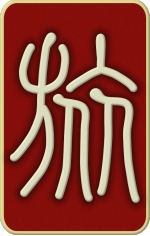
旅 Lǚ Traveling (Journeying) [hexagram 56]


Fire over Mountain
 Fire element
Fire element
Lunar month: 4 ; Host (controlling) line : 5
The Decision
A journey brings limited fulfillment. If the traveler is steadfast there will be good fortune.
‘A journey brings limited fulfillment’ – the weakness is central and submits to the strong. Maintaining restraint is the clever option and so ‘brings limited fulfillment’. If the traveler is steadfast there will be good fortune’ – magnificent is the time and importance of traveling.
旅: 小亨, 旅贞吉. Lǚ: xiǎo hēng, lǚ zhēn jí.
彖传: 旅, 小亨, 柔得中乎外, 而顺乎刚, 止而丽乎明, 是以小亨, 旅贞吉也. 旅之时义大矣哉! Tuàn zhuàn: Lǚ, xiǎo hēng, róu dé zhòng hū wài, ér shùn hū gāng, zhǐ ér lì hū míng, shì yǐ xiǎo hēng, lǚ zhēn jí yě. lǚ zhī shí yì dà yǐ zāi!
The Image
Fire on the mountain forms ‘Traveling’. The wise accordingly are prudent and cautious in the use of punishment and keep litigation as short as possible.
象传: 山上有火, 旅; 君子以明慎用刑, 而不留狱. Xiàng zhuàn: Shān shàng yǒu huǒ, lǚ; jūn zǐ yǐ míng shèn yòng xíng, ér bù liú yù.
Line Change 1
The traveler is distracted by trivial things, bringing misfortune.
‘The traveler is distracted by trivial things’ – low aspirations ensure calamity.
初六: 旅琐琐, 斯其所取灾. Chū liù: lǚ suǒ suǒ, sī qí suǒ qǔ zāi.
象传: 旅琐琐, 志穷灾也. Xiàng zhuàn: Lǚ: suǒ suǒ, zhì qióng zāi yě.
Line Change 2
The wanderer reaches a camp carrying his belongings and receives help from trustworthy staff.
‘Receives help from trustworthy staff’ – nothing to complain about.
六二: 旅即次, 怀其资, 得童仆贞. Liù èr: lǚ jí cì, huái qí zī, dé tóng pú zhēn.
象传: 得童仆贞, 终无尤也. Xiàng zhuàn: Dé tóng pú zhēn, zhōng wú yóu yě.
Line Change 3
The traveler’s shelter burns down and loses the aid of assistants; however steadfast there is danger.
‘The traveler’s shelter burns down’ – causing distress. It is inappropriate to treat assistants with disdain, the proper relationship is lost.
九三: 旅焚其次, 丧其童仆, 贞厉. Jiǔ sān: lǚ fén qí cì, sàng qí tóng pú, zhēn lì.
象传: 旅焚其次, 亦以伤矣. 以旅与下, 其义丧也. Xiàng zhuàn: Lǚ fén qí cì, yì yǐ shāng yǐ. yǐlǚ yǔ xià, qí yì sàng yě.
Line Change 4
The traveler rests in a shelter having obtained work with an ax but feels dispirited.
‘The traveler rests in a shelter’ – but the incorrect place. ‘Having obtained work with an ax’ – heart is not at peace.
九四: 旅于处, 得其资斧, 我心不快. Jiǔ sì: lǚ yú chù, dé qí zī fǔ, wǒ xīn bù kuài.
象传: 旅于处, 未得位也. 得其资斧, 心未快也. Xiàng zhuàn: Lǚ yú chù, wèi dé wèi yě. Dé qí zī fǔ, xīn wèi kuài yě.
Line Change 5
Shooting a pheasant, misses, but in the end high rewards.
‘In the end high rewards’ – reaching high.
六五: 射雉一矢亡, 终以誉命. Liù wǔ: shè zhì yī shǐ wáng, zhōng yǐ yù mìng.
象传: 终以誉命, 上逮也. Xiàng zhuàn: Zhōng yǐ yù mìng, shàng dài yě.
Line Change 6
The bird’s nest catches fire; the traveler first laughs but then laments. Losing cattle through carelessness. Misfortune.
Because the traveler is at the top, burning is appropriate. ‘Losing cattle through carelessness’ – not prepared to listen to guidance.
上九: 鸟焚其巢, 旅人先笑后号啕. 丧牛于易, 凶. Shàng jiǔ: niǎo fén qí cháo, lǚ rén xiān xiào hòu hào táo. sàng niú yú yì, xiōng.
象传: 以旅在上, 其义焚也. 丧牛于易, 终莫之闻也. Xiàng zhuàn: Yǐ lǚ zài shàng, qí yì fén yě. sàng niú yú yì, zhōng mò zhī wén yě.
The full set of 64 English translations is available in our new book 'Book of Changes - Deciphered' ➚.